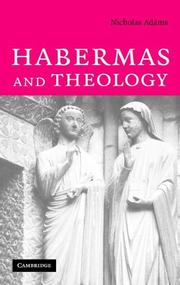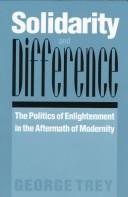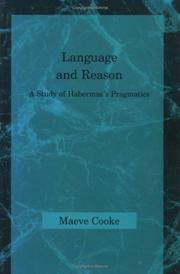| Listing 1 - 10 of 48 | << page >> |
Sort by
|
Book
ISBN: 1282977024 9786612977022 0739150111 9780739150115 9781282977020 9780739150092 073915009X Year: 2011 Publisher: Lanham, Md. Lexington Books
Abstract | Keywords | Export | Availability | Bookmark
 Loading...
Loading...Choose an application
- Reference Manager
- EndNote
- RefWorks (Direct export to RefWorks)
This book considers whether there is a legitimate or even necessary place for the perspective of 'care' when addressing questions of universal justice. To this end, it examines two major frameworks of contemporary moral philosophy_Jürgen Habermas's model of discourse ethics and Jacques Derrida's deconstructive ethics of radical singularity_in which the contrasting standpoints of communicative reciprocation and care for the absolute otherness of the other are respectively prioritized.
Caring. --- Habermas, Jürgen. --- Derrida, Jacques. --- Habermas, Jurgen.
Book

ISBN: 9780857455017 085745501X 9780857455000 0857455001 1282254286 9781282254282 9786613814937 6613814938 Year: 2012 Publisher: New York Oxford
Abstract | Keywords | Export | Availability | Bookmark
 Loading...
Loading...Choose an application
- Reference Manager
- EndNote
- RefWorks (Direct export to RefWorks)
Initially propounded by the philosopher Jürgen Habermas in 1962 in order to describe the realm of social discourse between the state on one hand, and the private sphere of the market and the family on the other, the concept of a bourgeois public sphere quickly became a central point of reference in the humanities and social sciences. This volume reassesses the validity and reach of Habermas’s concept beyond political theory by exploring concrete literary and cultural manifestations in early modern and modern Europe. The contributors ask whether, and in what forms, a social formation that rightfully can be called the “public sphere” really existed at particular historical junctures, and consider the senses in which the “public sphere” should rather be replaced by a multitude of interacting cultural and social “publics.” This volume offers insights into the current status of the “public sphere” within the disciplinary formation of the humanities and social sciences at the beginning of the twenty-first century.
Communication --- Public opinion --- Civil society --- Social aspects --- History. --- Political aspects --- Habermas, Jürgen. --- Habermas, Jurgen. --- History --- Habermas, Jürgen.

ISBN: 0521862663 0521681146 9780521681148 9780521862660 9780511621260 9781107322042 1107322049 0511621264 1139810561 9781139810562 1107316650 9781107316652 1107317614 9781107317611 1299318878 9781299318878 1107315697 9781107315693 Year: 2006 Publisher: Cambridge: Cambridge university press,
Abstract | Keywords | Export | Availability | Bookmark
 Loading...
Loading...Choose an application
- Reference Manager
- EndNote
- RefWorks (Direct export to RefWorks)
How can the world's religious traditions debate within the public sphere? In this book, Nicholas Adams shows the importance of Habermas' approaches to this question. The full range of Habermas' work is considered, with detailed commentary on the more difficult texts. Adams energetically rebuts some of Habermas' arguments, particularly those which postulate the irrationality or stability of religious thought. Members of different religious traditions need to understand their own ethical positions as part of a process of development involving ongoing disagreements, rather than a stable unchanging morality. Public debate additionally requires learning each other's patterns of disagreement. Adams argues that rather than suspending their deep reasoning to facilitate debate, as Habermas suggests, religious traditions must make their reasoning public, and that 'scriptural reasoning' is a possible model for this. Habermas overestimates the stability of religious traditions. This book offers a more realistic assessment of the difficulties and opportunities they face.
Religion --- Philosophy --- Habermas, Jürgen --- -21*01 --- 1 HABERMAS, JÜRGEN --- Religion, Primitive --- Atheism --- God --- Irreligion --- Religions --- Theology --- Godsdienstfilosofie: christelijke religie: filosofisch en rationeel --- Filosofie. Psychologie--HABERMAS, JÜRGEN --- Habermas, Jurgen. --- Habŏmasŭ, Wirŭgen --- Habŏmasŭ --- Khabermas, I︠U︡. --- Khabermas, I︠U︡rgen --- Ha-pei-ma-ssu, Yu-erh-ken --- Habeimasi --- הברמאס, יורגן --- יורגן הברמס --- 哈贝马斯 --- Politieke theorie. --- Publiek domein. --- Theologie. --- Philosophy. --- Habermas, Jürgen. --- Habermas, Jürgen, --- 1 HABERMAS, JÜRGEN Filosofie. Psychologie--HABERMAS, JÜRGEN --- 21*01 Godsdienstfilosofie: christelijke religie: filosofisch en rationeel --- Habermas, Jürgen --- 21*01 --- Habermas, Jürgen. --- Arts and Humanities --- Religion - Philosophy --- Habermas, Jürgen, - 1929 --- -Religion --- -Politieke theorie. --- Habermas, Jürgen, - 1929-

ISBN: 0585078394 9780585078397 0791440176 0791440184 1438422318 Year: 1998 Publisher: Albany State University of New York Press
Abstract | Keywords | Export | Availability | Bookmark
 Loading...
Loading...Choose an application
- Reference Manager
- EndNote
- RefWorks (Direct export to RefWorks)
This book provides a critical analysis of the debate between modernists and postmodernists through an analysis of the work of Jurgen Habermas, focusing on the role that he has played in this debate. The author offers an alternative to the dichotomy between modernism and postmodernism by developing the conception of the aftermath of modernity which takes seriously postmodern critiques of modernism while keeping intact certain key enlightenment ideals.
Enlightenment --- Postmodernism --- Poststructuralism --- Post-structuralism --- Philosophy, Modern --- Structuralism --- Influence --- Social aspects --- Habermas, Jürgen. --- Habermas, Jürgen --- Habŏmasŭ, Wirŭgen --- Habŏmasŭ --- Khabermas, I︠U︡. --- Khabermas, I︠U︡rgen --- Ha-pei-ma-ssu, Yu-erh-ken --- Habeimasi --- הברמאס, יורגן --- יורגן הברמס --- 哈贝马斯 --- HABERMAS, JURGEN, 1929 --- -POSTMODERNISM --- ENLIGHTENMENT --- POSTSTRUCTURALISM --- PHILOSOPHY --- HISTORY --- Habermas, Jurgen, 1929 --- -Postmodernism --- Philosophy --- History --- Habermas, Jurgen --- Habermas, jurgen, 1929

ISBN: 0262032171 0262270765 0585332037 9780585332031 9780262032179 0262531453 9780262531450 Year: 1997 Publisher: Cambridge (Mass.): MIT Press,
Abstract | Keywords | Export | Availability | Bookmark
 Loading...
Loading...Choose an application
- Reference Manager
- EndNote
- RefWorks (Direct export to RefWorks)
Philosophy of language
---
Pragmatics
---
Habermas, Jürgen
---
316:286
Book
ISBN: 1472579860 1472579844 147422007X 1472579852 9781472579850 9781472579836 1472579836 9781472579843 9781472579867 9781474220071 Year: 2015 Publisher: New York
Abstract | Keywords | Export | Availability | Bookmark
 Loading...
Loading...Choose an application
- Reference Manager
- EndNote
- RefWorks (Direct export to RefWorks)
"Christian metal has always defined itself in contrast to its non-Christian, secular counterpart, yet it stands out from nearly all other forms of contemporary Christian music through its unreserved use of metal's main musical, visual, and aesthetic traits. Christian metal is a rare example of a direct combination between evangelical Christianity and an aggressive and highly controversial form of popular music and its culture. Christian Metal: History, Ideology, Scene is the first full exploration of the phenomenon of Christian metal music, its history, main characteristics, development, diversification, and key ideological traits from its formative years in the early 1980s to the present day. Marcus Moberg situates it in a wider international evangelical cultural environment, accounts for its diffusion on a transnational scale, and explores what religious meanings and functions Christian metal holds for its own musicians and followers. Engaging with wider debates on religion, media and popular culture, Christian Metal: History, Ideology and Scene is a much-needed resource in the study of religion and popular music."--Bloomsbury Publishing.
Contemporary Christian music --- Heavy metal (Music) --- History and criticism. --- Social medicine. --- Medicine --- Philosophy. --- Habermas, Jurgen.
Book
ISBN: 3495478973 3495997040 Year: 2023 Publisher: München Alber
Abstract | Keywords | Export | Availability | Bookmark
 Loading...
Loading...Choose an application
- Reference Manager
- EndNote
- RefWorks (Direct export to RefWorks)
Identity (Philosophical concept) --- Reality --- Habermas, Jürgen. --- Henrich, Dieter, --- Habermas, Jürgen, --- Habermas, Jürgen
Book
ISBN: 303138881X 3031388828 Year: 2023 Publisher: Cham, Switzerland : Springer, Springer Nature Switzerland AG,
Abstract | Keywords | Export | Availability | Bookmark
 Loading...
Loading...Choose an application
- Reference Manager
- EndNote
- RefWorks (Direct export to RefWorks)
Education --- Psychology --- Philosophy --- Filosofia --- Educació --- Psicologia --- Piaget, Jean, --- Habermas, Jürgen --- Rogers, Carl R. --- Wallon, Henri,
Book
ISBN: 1438437412 9781438437415 9781438437392 1438437390 Year: 2011 Publisher: Albany State University of New York Press
Abstract | Keywords | Export | Availability | Bookmark
 Loading...
Loading...Choose an application
- Reference Manager
- EndNote
- RefWorks (Direct export to RefWorks)
Excavates the experiential structure of Habermas's communicative action.
Philosophy. --- Political science --- Habermas, Jürgen --- Political and social views. --- Habermas, Jurgen
Book
ISBN: 1438437382 1461906318 9781461906315 9781438437385 9781438437378 1438437374 Year: 2011 Publisher: Albany State University of New York Press
Abstract | Keywords | Export | Availability | Bookmark
 Loading...
Loading...Choose an application
- Reference Manager
- EndNote
- RefWorks (Direct export to RefWorks)
Reinvigorates Jürgen Habermas' early critical theory.
Social sciences --- Socialization. --- Social structure. --- Philosophy. --- Habermas, Jürgen. --- Habermas, Jurgen.
| Listing 1 - 10 of 48 | << page >> |
Sort by
|

 Search
Search Feedback
Feedback About UniCat
About UniCat  Help
Help News
News